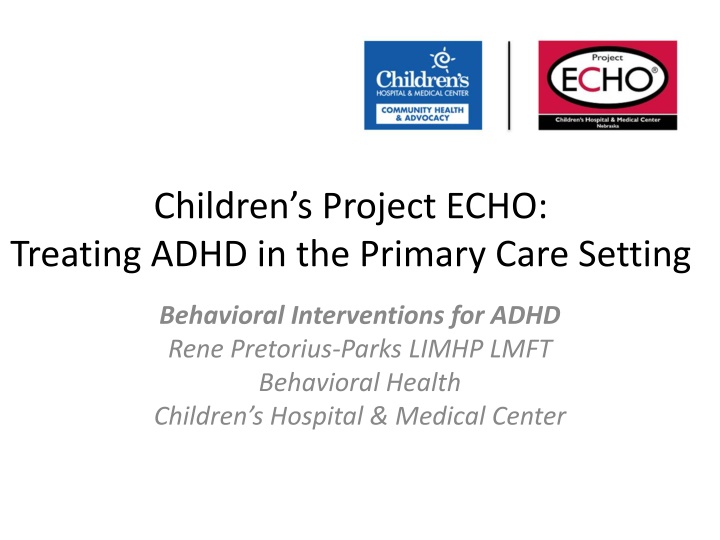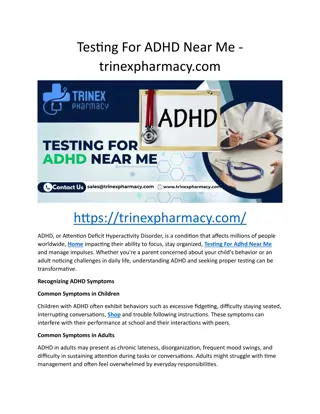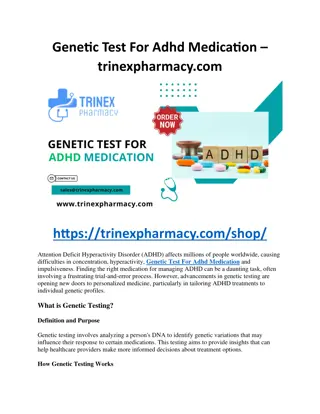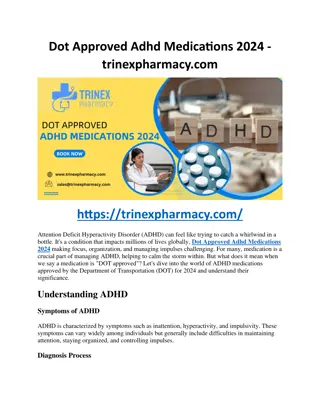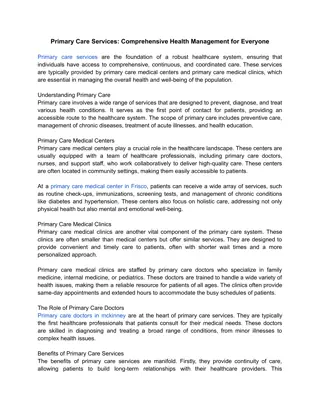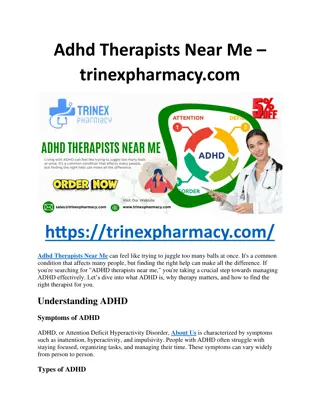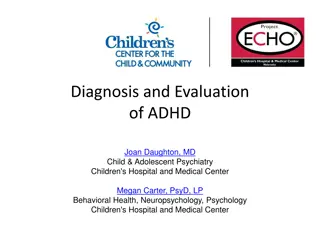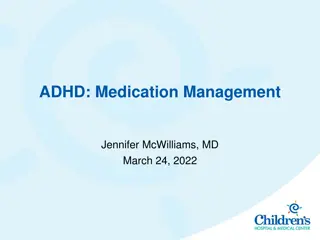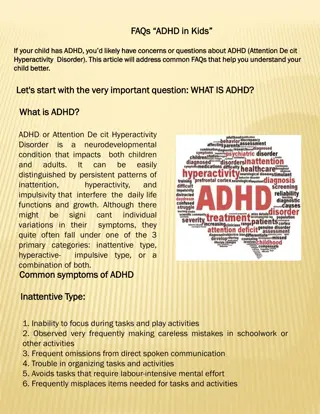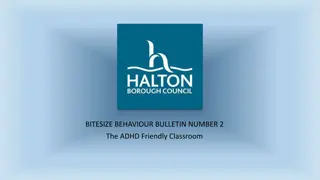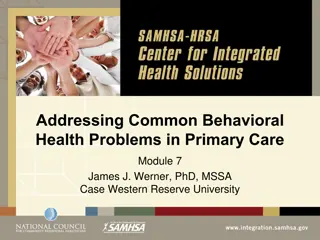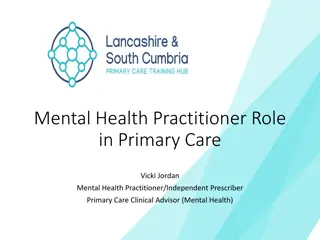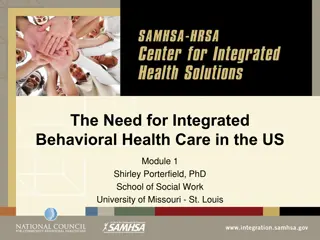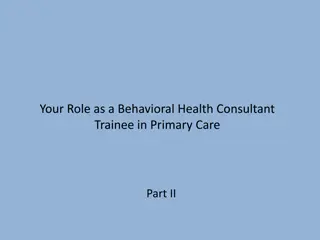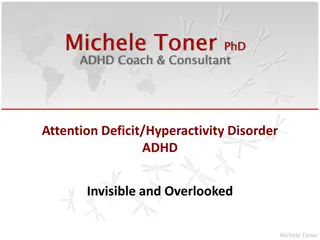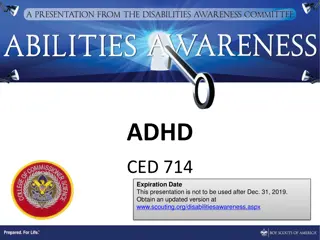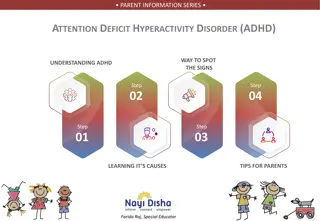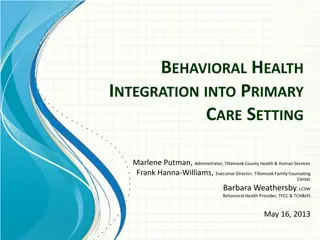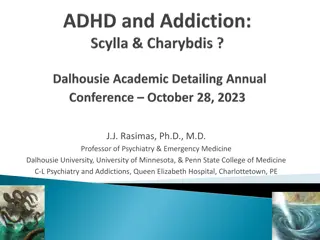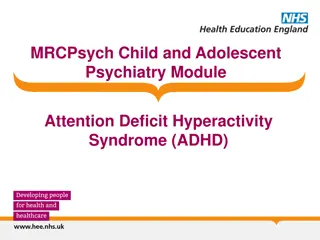Behavioral Interventions for ADHD in Primary Care - Key Principles and Strategies
Understanding the principles of behavior management and the impact of the parent-child relationship is crucial when treating children with ADHD in primary care settings. Psycho-education, parenting style changes, and immediate feedback are key strategies discussed. The quality of parent-child interactions can significantly influence behavioral outcomes, emphasizing the importance of positive reinforcement and early intervention.
Download Presentation

Please find below an Image/Link to download the presentation.
The content on the website is provided AS IS for your information and personal use only. It may not be sold, licensed, or shared on other websites without obtaining consent from the author.If you encounter any issues during the download, it is possible that the publisher has removed the file from their server.
You are allowed to download the files provided on this website for personal or commercial use, subject to the condition that they are used lawfully. All files are the property of their respective owners.
The content on the website is provided AS IS for your information and personal use only. It may not be sold, licensed, or shared on other websites without obtaining consent from the author.
E N D
Presentation Transcript
Childrens Project ECHO: Treating ADHD in the Primary Care Setting Behavioral Interventions for ADHD Rene Pretorius-Parks LIMHP LMFT Behavioral Health Children s Hospital & Medical Center
Presenter Disclosures Consultant/ Speakers bureaus No Disclosures Research funding No Disclosures Stock ownership/Corporate boards-employment No Disclosures Off-label uses No Disclosures
Overview & Learning Objectives 1. Identify at least 3 principles of behavior management that can be shared with parents of a child with ADHD. 2. Be able to describe the impact the parent-child relationship has on the effectiveness of behavioral management of an ADHD child 3. List initial school recommendations for parents after their child is diagnosed with ADHD.
Principles of Behavior Management Everything that is not medication Psycho-education .Psycho-education Psycho-education! ADHD child : Parenting Style Changes to Parenting Style: Executive Functioning Delay Verbal/non-verbal working memory; inhibition & interference control; self-awareness & self-monitoring; planning & problem- solving; anticipation & preparation to act; self-regulation over time; emotional self-control Quantifiable 30-40% delay
Principles of Behavior Management More immediate & freq feedback (reinf/consq) Verbal praise; attending; touch; tangible reward NORMALIZE external motivation Be consistent (over time; not give up too soon; across settings; across caretakers) Less talking the better! Use your actions Keep disability perspective Don t personalize
Parent-Child Relationship Why does this matter? Ongoing neg p-c interactions over time can defiance Defiance AND Inattention/Hyperactivity/Impulsivity Essential to positive p-c interactions as a part of beh. mngt. Catch your Child Being Good game; praise positive play behaviors; giving & taking attention Ages 2-6: Referral to PCIT (Early is KEY)
School Recommendations Remember: School psychologists not allowed to diagnose School eval vs Private testing and diagnosis Documentation of DX to school from MD Determine need for IEP/504 Plan Psycho-education Neuro-developmental Disorder; impairments in school setting; required by law; same starting line
School Recommendations Common accommodations: Preferential seating ALL testing in quieter location Check in/Check out Person later on Behavioral Plan aggression/disruption/off-task Resource academic delays Accommodations/Resources/Support tailored to student individualized Help parent advocate for child!!!
References 1. Barkley, R.A., (2005). Taking Charge of ADHD. The Complete, Authoritative Guide for Parents (rev ed.). New York: The Guilford Press 2. Barkley, R.A. ADHD FROM A to Z: Advances in the Understanding and Management of Attention Deficit Hyperactivity Disorder [PowerPoint slides].
